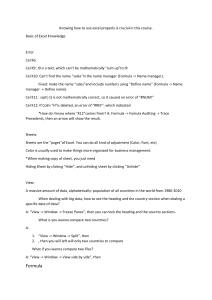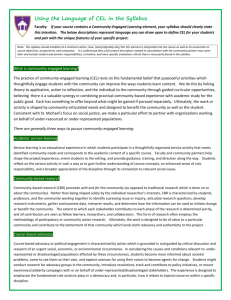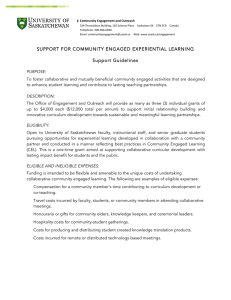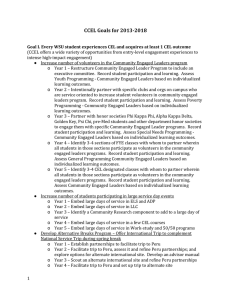2011/02/23
advertisement
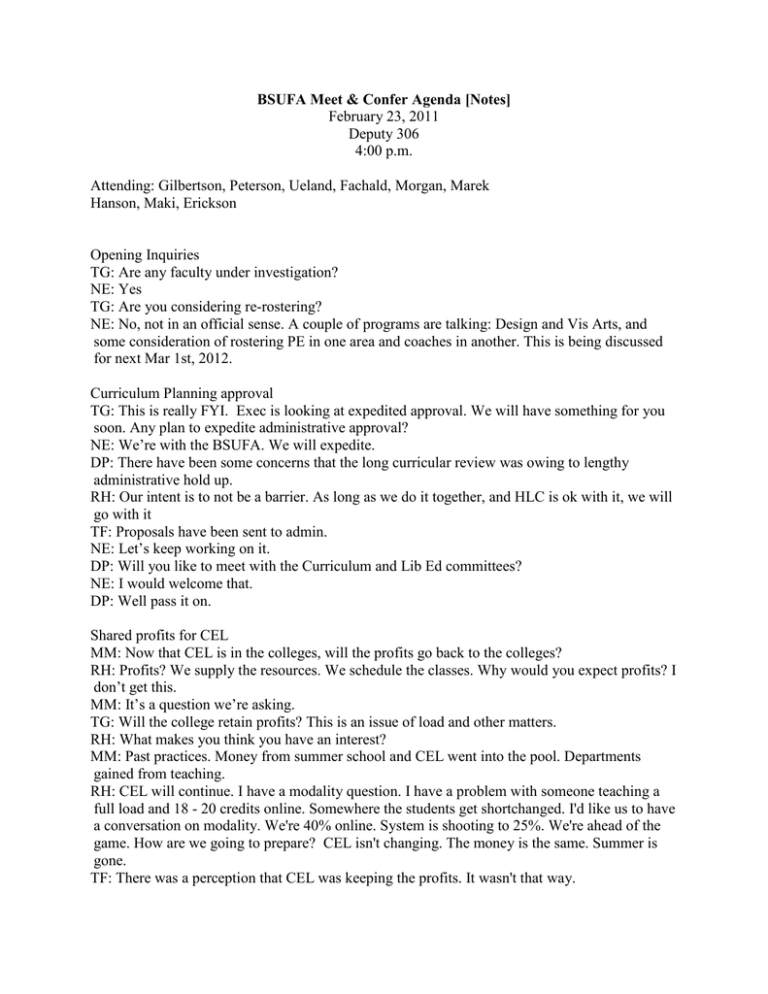
BSUFA Meet & Confer Agenda [Notes] February 23, 2011 Deputy 306 4:00 p.m. Attending: Gilbertson, Peterson, Ueland, Fachald, Morgan, Marek Hanson, Maki, Erickson Opening Inquiries TG: Are any faculty under investigation? NE: Yes TG: Are you considering re-rostering? NE: No, not in an official sense. A couple of programs are talking: Design and Vis Arts, and some consideration of rostering PE in one area and coaches in another. This is being discussed for next Mar 1st, 2012. Curriculum Planning approval TG: This is really FYI. Exec is looking at expedited approval. We will have something for you soon. Any plan to expedite administrative approval? NE: We’re with the BSUFA. We will expedite. DP: There have been some concerns that the long curricular review was owing to lengthy administrative hold up. RH: Our intent is to not be a barrier. As long as we do it together, and HLC is ok with it, we will go with it TF: Proposals have been sent to admin. NE: Let’s keep working on it. DP: Will you like to meet with the Curriculum and Lib Ed committees? NE: I would welcome that. DP: Well pass it on. Shared profits for CEL MM: Now that CEL is in the colleges, will the profits go back to the colleges? RH: Profits? We supply the resources. We schedule the classes. Why would you expect profits? I don’t get this. MM: It’s a question we’re asking. TG: Will the college retain profits? This is an issue of load and other matters. RH: What makes you think you have an interest? MM: Past practices. Money from summer school and CEL went into the pool. Departments gained from teaching. RH: CEL will continue. I have a modality question. I have a problem with someone teaching a full load and 18 - 20 credits online. Somewhere the students get shortchanged. I'd like us to have a conversation on modality. We're 40% online. System is shooting to 25%. We're ahead of the game. How are we going to prepare? CEL isn't changing. The money is the same. Summer is gone. TF: There was a perception that CEL was keeping the profits. It wasn't that way. WM: CEL courses produced 4.7mil .. [WM ran through the CEL financials.] TF: This gets to modality. We need people off the $65. The amount of money we got before is way more money. The most expensive way of teaching is load. In Business, we’re going to be more militant in limiting on campus students taking online. It's going to turn into a resource issue. JU: We need faculty to teach the same classes and we need to find faculty to teach. RH: Let’s look at both sides of resources. How are we going to massage what we have? TF: There's going to be one of things students will have to face. We can limit our offering, but the students need a minimum number of credits to remain full time. We had a cost structure that worked. We need an update on the CEL guidelines. TG: Are resources going into DistanceMN? RH: We're funding it, but any resources that go into DistanceMN are from DMN. New employees pay for themselves. It a NCT deal. It's in Bill’s shop but they have a director. We don't put any money into it. DP: We just wonder if there would be any cost savings. RH: We really need Distance MN running. It generates significant numbers. JU: Is this envisioned as a way of recruiting 2 year students to BSU? RH: DistanceMN courses are not BA courses. It’s mainly technical stuff. BSU has an AA. We don't need one at NTC. TG: Is there an update on CEL guidelines and caps? NE Guidelines of 12 credits, 100 students. The issue was that a dean advised faculty to hold off offering CEL until the balance with on-campus courses was dealt with. TF: The guideline in one college is 9, and in the other colleges it’s 12. JU: Is it “Do as you did in the past, and you’ll be corrected if needed?” TG: Is this a moving target and a decision hasn't been made? JU: Is it the college deciding on their own? NE: Yes. Personal letters of recommendation RH: I’ve had two requests for personal letters. TG: We’ve had some concerns from recipients. MM: It’s been form letter. RH: Yes. The letter makes it clear it’s the budget. MM: That’s not what we asked for, and not what you said you would do. RH: That’s what I intended. I have two I just finished, and they’re going out. If they want one, they have to ask. Personal release time for interviews TG: How should faculty handle this? RH: I don't want to set a policy on this. JU: Should they make a note? RH: I'd ok a little codicil with the request. I will work with some accommodation on that. Tuition extensions for those who are being cut Health care extensions for those who are being cut RH: We can only do what the contract lets us. Have the retrenchment letters gone out? RH: The letters are finished and going out. Will President Hanson release the 600 word essays? RH presented TG with a binder of the essays. Title IX: Dr. Erwin should have a rostering report for us. WM presented the exec with a multi-page document. JU: This will speak to our compliance questions? That we’er choosing proportionality over other guides? MB: These are the proportionality numbers JU: Why did we choose proportionality? Is that the best option? MB: We believe it is. There are three prongs in Title IX. The survey prong could ask us to things we can’t do. We went with proportionality. Update on financials: non-contractual release time, GAs, adjuncts and fixed-term faculty NE: This was discussed at length with the deans. They have each been given 0 -3 credits of reassign time. JU: Is there any way we can report this out every semester? NE: The report is in the spring. JU: It seems to make sense to have reassign time. NE: We are looking at a 2 year process. We are close to eliminating half the GAs. DP: Programs need to know how many GAs they can rely on NE: That information has been handed to the departments. JU: Will there be prioritization for instructional GAs? NE: Yes. There are other areas, but teaching is number one. NE: There is money available for adjuncts and teach-out. TF: That's coming out of academic affairs? NE: Yes. TF: Should programs start pursuing money for teach-out? NE: As we identify courses for teach out, bring it to planning. JU: What is the budget and how has it been reduced? NE: Money has gone down. But there is the same this coming year as there was this year. RH: There are a lot fewer fixed term faculty. NE: And they come out of the same account. Update on Library RH: We have to work on that. Consider what's our summer program and research and use. NE: I'll meet with Bob this week. JU: Time frame? RH: We have to get the fall term scheduled first. Then the library. It's number 2. BSUFA Senate Resolutions MM distributed the 24 Jan 2011 Senate Resolutions in response to the recalibration plan. (attached) TG distributed the What is the university's mission? (attached) TG: We would like responses to these. MM distributed a statement from Webb. It’s been requested that this statement be read into the record. Please consider it read in. We’d like responses to these statements. AAR TF: Our concern is that students are perceiving that a program will be there when it’s not. DP: Admissions is presenting what's on the books, and has told us they are assuming that students will switch majors. Faculty consider this a bait and switch. NE: That adds more pressure to expedite curricular changes. JU: Is this the strategy you’re promoting? It seems problematic. NE: It is problematic. It started with one member not willing to entertain the idea that students might change majors. It means we have to expedite the curricular changes. Questions about measuring retention and graduation rates. MM: The recalibration plan states that you want an increase in retention of 20%. How will we measure that? Which student groups are we including for retention? RH: IPEDs and MnSCU have a say on what the definition of the rates are. I hope we can get to a standard. IPEDs calculated the completion rate. MM: We can count on Administration for guidance on the definition they are using? RH: Yes. We need to be on the same page. RH: “#5: How might the 3-year degree influence retention?” That’s a good question. That will be complete guess work. KM: A question about retention rates by major. How will this affect undecided majors? How do we advise? Do we advise students to declare a major right away? RH: Careful evaluation of variables will help us. I am interested in having all the departments ask the right questions. Emergency testing during class times KM: A request: Please don’t hold these during class time. WM: We have to do it once a semester. We try to rotate them. We'll look for a space. Status update on campus childcare RH: Good news. We have a partner. We’ll continue with campus child care for preschool. Infanttoddler is a different question. JU: The facility compliance issues have been settled? WM: There might need to be accommodations made yet. Clarify the relation with the Title IX Committee TG: These are questions for VP Erwin. Some questions involving the Title IX committee, when it met ... RH: I asked her to change the meeting. I want 3 or 4 a year. One a year meets the law, but that's not very communicative, and some of the issues we've had have been about being communicative. The consultant information we received is not public. WM: A consultant toured the facilities for gender equity. She was hired by legal counsel for legal advice. While she was here, she also gave a presentation for professional development purposes. JU: This was more of an expert witness giving us where we stand? RH: Yes WM: Yes. Evaluation of high school instructors NE: My understanding is that it's going forward. Grants JU: Pat Guilfoile is working on a draft proposal on grants. Are faculty involved? NE: It’s early. It hasn't been vetted. JU: It makes sense to bring in some people on the ground. TF: The faculty are the primary investigators, they can help you formulate the plan. There’s less blowback if faculty are in at the start. NE: I understand. JU: You'll get more buy-in if you bring the faculty into the process while the proposal is being drafted. NE: Maybe the CPD? JU: Better to select from the BSUFA. Those are elected representatives. TF: We don't have faculty on the tuition fee committee, either. RH: That's not up for debate. It doesn't need informed consent. Fees are an administrative decision. This is a symptom of our problem. It's about communication. I know we can do better. TF: The question was about a student being on tuition fee committee, and getting representation of online students on it. Administration Items Response to BSUFA RH distributed his repo read RH distributed his response to the BSUFA’s first response to the recalibration plan, and read his response into the record. (attached) Positions NE There are ads out for replacements for Sheela and for replacing Mary Ann Rietmier JU: We’re filling retirements? NE: Yes - as usual. JU: Recalibration has put in place a direction and we're following it. RH: Yes. Carry forwards WM presented a handout: Short term reserve (attached) WM: We have here a way of creating a 1.2m enrollment contingency reserve account. This shows by division where this comes from. We don’t have the Academic Affairs broken out for you yet. JU: Will the reserve be reinstated if we don't have a problem? WM: That's come up. We're discussing it. We want to hold it for a couple cycles. TF: Is differential tuition in here? TF: $1.2m is about 200 FTE, about 5%. WM: Differential tuition, and travel are off the table. JU: How is this being held? By departments? WM: We'll send an email JU: Does this affect equipment budget? WM: Yes. RH: What's been the carry forward balance for the past couple of years? WM: It’s been growing. It should be. RH: Most universities don’t have carry forwards. WM distributed a sheet on a long-term carry-forward policy. WM: This is a draft policy and procedure, presented to start discussion. It's consistent with what other universities do with carry-forward funds. It allows us to move them to a higher level, at a university level rather than department level. A portion stays with the department, but the balance rolls into a university budget or can stay with department to save up for large expenditures. We're looking at more discussion. DP: We appreciate that you're helping departments plan for the long term. Would you have a process in place so that heavy-equipment needs can be met even in the short term? WM: Longer term, that will help. NE: Your point regarding equipment is well taken. TG was presented with memo from Lisa Erwin stating the student handbook is out of compliance with MnSCU Board Policy 3.8. This should go to to academic affairs. Ended at 6:00 pm Submitted M C Morgan

